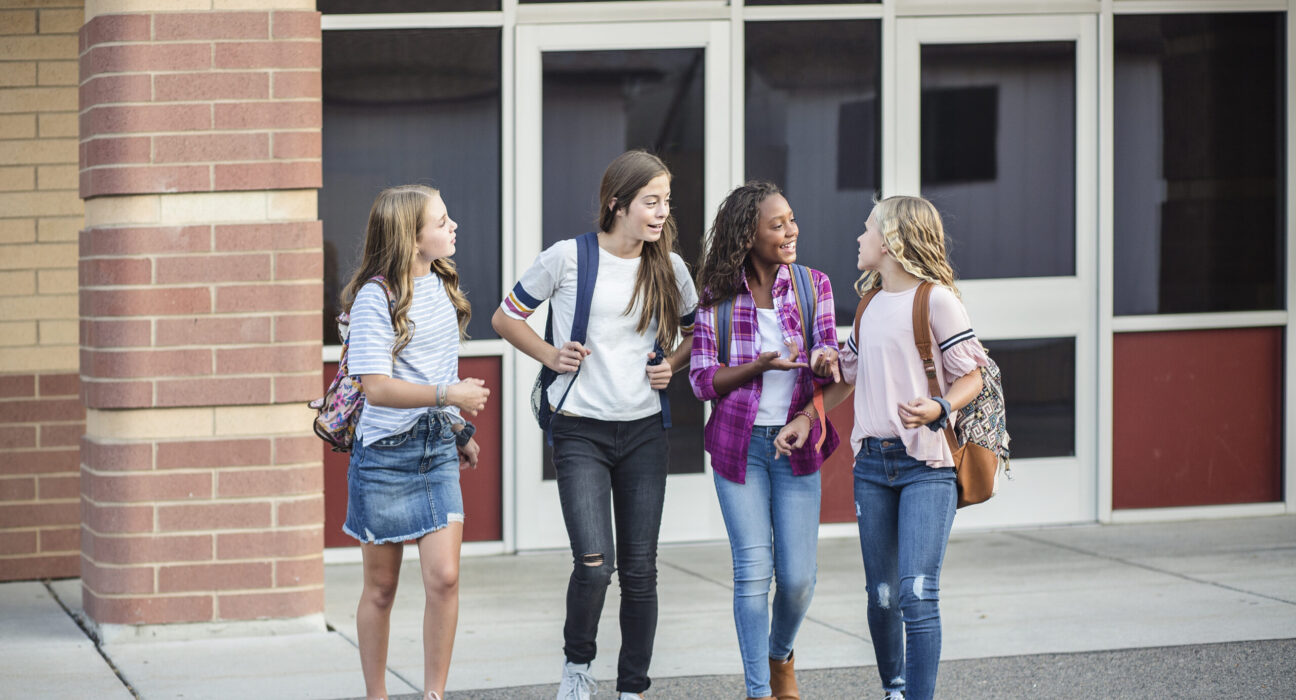I remember walking into the cafeteria of my latest school, and it was like someone punched me within the stomach. I used to be in sixth grade. My family had just moved from Virginia to Ohio. At first, I attended the local Catholic school. Within the primary two months, I used to be begging my parents to go to the general public school because the women were so mean to me. And after I look back, wow, were they cruel.
My maiden name is Ackerman. They’d call me “Lisa Acneman” as sixth grade brought with it oily skin and a few breakouts. When my parents decided that I’d change schools, I felt relieved. Off to public school I went. But soon I discovered that it didn’t matter whether I went to parochial or public school: girls were still mean.
Instantly, a bunch of ladies took me in
They invited me to sit down at their lunch table. Little did I do know that they’d kicked one other girl off the table so I could sit with them. I used to be so grateful to have friends, but I used to be a bit naïve. Maybe that’s because I grew up in a house where all of us supported one another and my assumption going “out into the world” was that everybody was like that, too.
Then sooner or later I walked into the cafeteria, and I nearly dropped my brown paper lunch bag. I checked out the table where I had been sitting for the past week, my first week at college. I counted the number of ladies on the table—eight. Eight was the utmost number of people that could sit at one table. The two girls who were the “leaders” checked out me, whispered to the opposite girls on the table, and everybody turned to have a look at me and laugh.
My heart sank. I went as much as the table and feebly asked, “Is there space for me here?” hoping perhaps I used to be unsuitable or that it wasn’t because it seemed. I couldn’t feel my feet beneath me. I felt dizzy.
I can’t remember what they said, but I will need to have gotten the image because I remember turning and quickly looking around for a brand new place to sit down. It was a small cafeteria so someone would notice me standing on their lonesome soon. I didn’t want anyone to have a look at me. My ears were ringing, my hands were clammy, and my heart was beating out of my chest. I felt the eight girls’ snickering whispers like daggers in my back. There was no physical fight or blowup so the teachers on lunch duty were none the wiser.
I saw a table with nobody at it. So, I sat down. I desired to cry. But I didn’t.
I sat alone for 2 months
Eventually, I sat with a brand new group of individuals. For the subsequent two years that we lived in Ohio, I had some good experiences—I also have a friend from that point who continues to be one in all my best friends. But the 2 girls who banished me from the lunch table continued to be bullies. Yes, that’s what I can call them now as a psychotherapist and adult who understands what was really occurring. They were the sort of “friends” who would invite you over and also you’d feel like, “Oh, good! We are friends again!” only to have them negatively discuss you or put you down.
We all have had experiences like this
Just the opposite day, one other mom friend of mine told me that she waved to 2 mothers talking they usually checked out her and laughed. It happens in childhood. It can even occur between adult women.
As a psychotherapist, I intimately know that when someone hurts others it’s because they’re hurting. I even have counseled each the bully and the one being bullied.
I do know, too, from counseling parents how, when our youngsters’s lives eclipse our own, we remember (consciously or unconsciously in our body’s cellular memory) our own experiences of hurt, rejection, and betrayal. And those old experiences, though healed, come back up and make us tender.
I had a possibility recently to feel such tenderness. I’ll share that story in a moment.
But first, I need to share this—the triumph. What got here out of my experiences with “mean girls”?
I became an “includer”
After these heartbreaking experiences, I became someone who sees the outsider and appears to incorporate them. I became someone who is nice at bringing people in and making them feel like they matter and are an element of things.
I learned through years and years of mindfulness and compassion practices how one can create space to “include everything” and how one can abide with whatever is arising—even the nasty, hard-to-look-at, shameful parts of myself. I practiced forgiveness.
Those two bullies? I forgave them, despite the fact that they didn’t ask for my forgiveness. Other individuals who have hurt me? Other people I even have hurt? I’m working on receiving forgiveness and lengthening forgiveness to them, too. Nothing and nobody is excluded from forgiveness. Everything and everyone seems to be included.
I became an “includer” in my work
As a psychotherapist and coach with individuals and groups, I can hold space for somebody and help them learn how one can include all of it—to carry the parts of themselves they could have abandoned, ignored, tried to maintain quiet, or kicked to the curb. I can abide with a client as they learn that excluding anything creates more suffering.
I became an “includer” in my family
As parents, Brian and I model compassion and empathy to our youngsters. We attempt to create “abiding space” for our youngsters to mindfully name and express whatever is going on inside them. On the great days, I can say, “I’ll abide with you. I’ll be with you in this.” And, after all, there are days after I am short-fused and I snap at them. Then, we start again. We come back together and include even those less-than-perfect moments in our human and imperfect way of being family.
Our family has turn out to be “includers”
We are about community and creating space—in our home, in our lives, in our hearts—for adults and kids to feel loved and included just as they’re.
Through gentleness, compassion, and mindful attention, these early experiences of rejection, betrayal, and hurt transformed me. Through loving attention, through learning to incorporate all of it with mindfulness and compassion, I—together with plenty of grace—transformed these hurtful experiences into compassionate, inclusive arms to carry, words to talk, hands to provide, and presence to supply.
They proceed to make me tender. And that’s good—even holy—because they open me to see the hurt in others and be tender with them. It offers a possibility for deepening my practice of mindfulness and compassion—for opening my heart even wider.
Like recently when my daughter got here home from pre-k and told me, yet again, about an experience at college with somewhat girl. My daughter is 4.
The details aren’t mine to share, but hearing about my daughter’s experience broke my heart. I talked with a couple of other mothers about it, and God am I grateful to be alongside mothers who’re also “includers”—each inside our circle of mom friends and within the lives of our youngsters. I talked with my husband. And, most significantly, I talked with my daughter.
When my daughter—your daughter—is looking back on her childhood, she is going to tell her own story and I hope it should be one in all how we walked alongside our girls. How we empowered them.
I hope all of our girls will someday share stories like:
—
—
—
—
—
In my experience of meditation, compassion, and mindfulness, nothing could be excluded. Exclusion creates suffering. Inclusion facilitates healing. It’s the trail to true freedom.
This is what I’m modeling for my daughter
I do know you wish to model this to your daughter, too. You are the sacred space in your daughter. And I do know you’re doing one of the best you possibly can.
This is how we heal the “mean girls” culture: we hold, we include, we love, we empower, and we regard our girls. And we model this in how we treat other women.
If you’re a parent to a daughter, regardless of the age, are you able to imagine your daughter telling such a story? Can you imagine creating the space for her to share, to abide along with her, and to empower her? Can you imagine raising girls who “include”?
Can you imagine all modeling how one can be an “includer”? And resolving conflicts, hurts, or insecurities with regard and compassion?
Can you imagine how this may impact our world if we raise daughters who know how one can name what is going on inside them and a situation? Who know how one can speak up within the face of injustice? Who imagine of their innate goodness? And who include relatively than exclude because they’ve an inner confidence and have been raised to hearken to the wisdom of their inner voice?
We to assume it and create it—for all of us women, for our daughters, and for our world.
Lisa is self-publishing her first book, Gems of Delight: seasonal inspirations for mothers to heal the hurry and embrace what’s sacred.
The Marriage Minute is an email newsletter from The Gottman Institute that can improve your marriage in 60 seconds or less. Over 50 years of research with 1000’s of couples has proven a straightforward fact: small things often can create big changes over time. Got a minute? Sign up below.




















